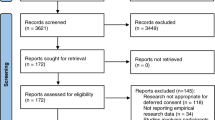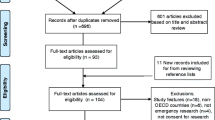Abstract
Improving the treatment of life threatening emergency illness or disease requires that new or novel therapies be assessed in clinical trials. As most subjects for these trials will be incapacitated there is some controversy about they might best protected whilst still allowing research to continue. Recent European and UK clinical trials legislation, which has effectively stopped research into emergency conditions, is discussed. Possible changes to these regulations are proposed.
Similar content being viewed by others
Notes
CRASH is an abbreviation for “Corticosteroid Randomisation After Significant Head Injury”. For further information see: http://www.crash.lshtm.ac.uk/
References
Historical Origins of the Nuremberg Code. (1992). In G. J. Annas & M. A. Grodin (Eds.), The Nazi doctors and the Nuremberg code. Oxford University Press.
World Medical Association Declaration of Helsinki; http://www.wma.net/e/policy/b3.htm; Accessed 13th November 2006.
Governance Arrangements for NHS Research Ethics Committees, Department of Health 2001; http://www.dh.gov.uk/assetRoot/04/05/86/09/04058609.pdf; Accessed 13th November 2006.
MRC CRASH Trial National Coordinators. (2003). Update on progress in the international, multicenter, randomized, controlled trial of corticosteroids after significant head injury. Current Opinion in Critical Care, 9, 92–97.
Eckmans, T., Bessert, J., Behnhe, M., Galtmeier, P., & Rűda, H. (2006). Compliance with antiseptic hand rub use in intensive care units: The Hawthorne effect. Infection Control and Hospital Epidemiology, 27, 931–934.
Patient Self-Determination Act of 1990; www.fha.org/acrobat/Patients%20Self%20Determination%20Act%201990.pdf; Accessed 12th November 2006.
Adults with incapacity (Scotland) Act 2000; www.opsi.gov.uk/legislation/scotland/acts2000/20000004.htm; Accessed 12th November 2006.
Sulmasy, D. P., Haller, K., & Terry, P. B. (1994). More talk, less paper: Predicting the accuracy of substituted judgments. American Journal of Medicine, 96, 432–438.
Shalowitz, D. I., Garret-Mayer, E., & Wendler, D. (2006). The accuracy of surrogate decision makers: A systemic review. Archive of Internal Medicine, 166, 493–497.
Directive 2001/20/EC of the European Parliament and of the Council of 4 April 2001 on the approximation of the laws, regulations and administrative provisions of the Member States relating to the implementation of good clinical practice in the conduct of clinical trials on medicinal products for human use. Official Journal of the European Communities 1.5.2001 L 121/34; www.eudract.emea.eu.int/docs/Dir2001-20_en.pdf; Accessed 12th November 2006.
Lemaire, F., Bion, J., Blanco, J., Damas, P., Druml, C., Falke, K., Kesecioglu, J., Larsson, A., Mancebo, J., Matamis, D., Pesenti, A., Pimentel, J., Ranieri, M., ESICM Task Force on Legislation Affecting Clinical Research in the Critically Ill Patient. (2005). The European Union Directive on Clinical Research: Present status of implementation in EU member states’ legislations with regard to the incompetent patient. Intensive Care Medicine, 31, 476–479.
Liddell, K., Chamberlain, D., Menon, D. K., Bion, J., Kompanje, E. J. O., Lemaire, F., Druml, C., Vrhovac, B., Wiedermann, C. J., & Sterz, F. (2006). The European clinical trial directive revisited: The VISEAR recommendations. Resuscitation, 69, 9–14.
The Medicines for Human Use (Clinical Trials) Regulations 2004; www.opsi.gov.uk/si/si2004/20041031.htm; Accessed 12th November 2006.
Spöhr, F., Arntz, H. R., Bluhmki, E., Bode, C., Carli, P., Chamberlain, D., Danays, T., Poth, J., Skamira, C., Wenzel, V., & Böttiger, B. W. (2005). International multicentre trial protocol to assess the efficacy and safety of tenecteplase during cardiopulmonary resuscitation in patients with out-of-hospital cardiac arrest: The Thrombolysis in Cardiac Arrest (TROICA) Study. European Journal of Clinical Investigation, 35, 315–323.
Mason, S., Barrow, H., Phillips, A., Eddison, G., Nelson, A., Cullum, N., & Nixon, J. (2006). Brief report on the experience of using proxy consent for incapacitated adults. Journal of Medical Ethics, 32, 61–62.
The CRASH Trial Management Group. (2004). Research in emergency situation: with or without relatives consent. Emergency Medicine Journal, 21, 703.
Consultation on amendment to the medicines for human use (clinical trials) regulations 2004 (S.I. 2004/1031). Medicines and healthcare products regulatory agency MLX326; www.mhra.gov.uk/home/idcplg?IdcService=SS_GET_PAGE&useSecondary=true&ssDocName=CON1004431&ssTargetNodeId=373; Accessed 14th November 2006.
Nightingale, S. L. (1996). Exception from informed consent requirements for emergency research (from the Food and Drug Administration). Journal of the American Medical Association, 276, 1632.
Mental Capacity Act 2005; www.dca.gov.uk/menincap/legis.htm; Accessed 15th November 2006.
Smithline, H. A., & Gerstle, M. L. (1998). Waiver of informed consent: A survey of emergency medicine patients. American Journal of Emergency Medicine, 16, 90–91.
Booth, M. G., Lind, A, Read, E., & Kinsella J. (2005). Public perception of emergency research: A questionnaire. European Journal of Anaesthesiology, 22, 933–937.
British medical Association; Organ donation in the 21st century: Time for a considered approach; www.bma.org.uk/ap.nsf/Content/Organdonation21st∼current; Accessed 12th November 2006.
Author information
Authors and Affiliations
Corresponding author
Additional information
An earlier version of this article was presented at The 7th International Conference on Bioethics on “The Ethics of Research in Emergency Medicine”, held on June 2, 2006, Warsaw, Poland.
Rights and permissions
About this article
Cite this article
Booth, M.G. Informed Consent in Emergency Research: A Contradiction in Terms. Sci Eng Ethics 13, 351–359 (2007). https://doi.org/10.1007/s11948-007-9028-3
Received:
Accepted:
Published:
Issue Date:
DOI: https://doi.org/10.1007/s11948-007-9028-3




